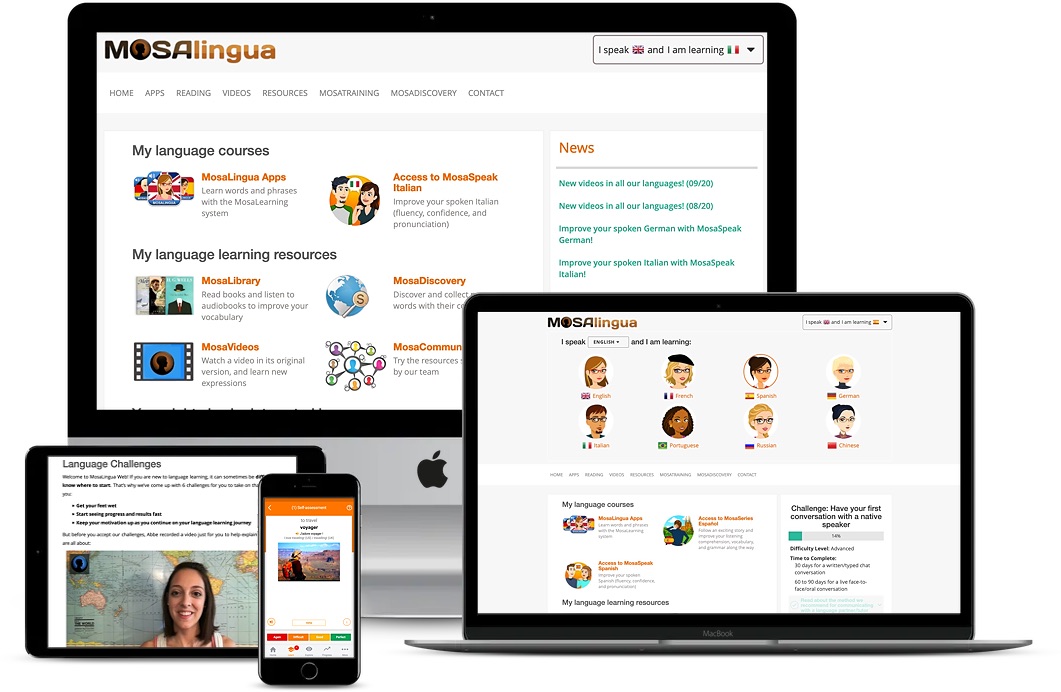
Language Learners’ FAQ: Everything You Need to Know About How to Learn a Language
Over the past decade, we’ve gotten thousands of questions from MosaLingua readers about various aspects of language and learning. We finally decided to put the ones we get asked most often in one place, as a sort of beginner’s guide to language learning. Take a look through the FAQ below for some great information and resources on lots of different topics related to language learning. Or, click one of the titles in the table of contents below to jump to a question you’re curious about.
Why should I learn a second language?
“English is my native language, and nowadays almost everyone in the world can speak at least basic English. Plus, when I travel and try to use the language of the place I’m visiting, locals just reply to me in English. So, what’s the point of learning a foreign language?”
If learning a language doesn’t interest you, this may not be the blog for you! But hear us out… There are many different great reasons to learn a new language! Not everyone who begins learning a language does it to eventually achieve bilingual status. Having basic conversational abilities in a language can open lots of doors to opportunities you may never have thought of. Here’s a list of some of the most common motivating factors for learning languages:
Travel more easily
Talking with locals, getting around more easily, ordering the food you actually want at a restaurant, or reserving a hotel room — knowing a foreign language eases communication abroad in many ways. Even if you only know the basics, you’ll find travel much easier and more pleasant in any country where your target language is spoken. It also affects the attitude that locals adopt toward you, and how you might be treated while traveling. After all, there’s nothing people appreciate more than visitors who make the effort to communicate in the local language.
Keep your brain healthy
Learning a language is beneficial to the brain in several ways, which we’ve listed in our article on the advantages of being bilingual. Chief among the positive effects of learning a language, as reported by a study from the University of Edinburgh, is that it significantly slows the aging of your brain. In other words, bilingual brains stay younger and more agile longer than those of people who speak only one language. And that’s just one of many surprising neurological benefits of learning a new language.
Understand the world better
Federico Fellini, an Italian movie producer, once said, “A different language is a different vision of life.” Learning a new language means learning a whole new vocabulary, including new words that can give you a new perspective on the world. Take the German word schadenfreude, a feeling of pleasure derived from another’s misfortune. Or the Portuguese word saudade, a feeling of longing for an absent something or somebody that you may never see again. And the French word depaysement, something similar to homesickness, but more intense and deeply nostalgic — the feeling of being somewhere you utterly don’t belong.
With each new word you learn, many of which have no direct translation in your own language, you learn something new about a culture and how others experience the world. Over time, you begin to experience the world that way, too, and see it differently. A whole new set of knowledge is made available to you, and with it, your mind is opened.
Get a better job or make more money
Speaking two or more languages is a real advantage when it comes to finding a job, and looks great on a resume or CV. This is especially true if you want to work for an international company, or in a position that requires knowledge of a second language. Furthermore, a second language is a concrete skill that can translate to a higher salary. We talk more about that in our article on language and your career.
How hard is it to learn a new language?
“I’ve been wanting to learn German for a while now, but I’ve been putting off getting started because I’ve heard that it’s a really tough language. Is it really that hard to learn a new language, and what are the factors that make a language more or less difficult?”
Ah, the million-dollar question! Many people never learn a new language, just because they’re afraid to begin! They may think that they don’t have what it takes and that others who have successfully learned a foreign language “have a special knack for languages.” Well, we have the experience and expertise to tell you with certainty that this simply isn’t true. Everybody has to start somewhere. The only difference between someone who fails and someone who succeeds is motivation, willpower, perseverance, and regular practice.
Generally, it’s not learning a new language per se that’s difficult or easy. Nor does it have to do with the target language itself (although some are admittedly more complex than others). Instead, it has more to do with how you learn, whether the approach you’ve chosen is effective and seems simple or, alternatively, insurmountable. Before even starting, we recommend thinking about all the different tools and resources that you might use to learn a language.
It’s also important to think about which tools and resources fit best with your goals and preferences. Choosing the right tools and learning techniques and methods is essential to staying motivated and making continuous progress.
So, long story short, learning a language isn’t difficult. It may be scary to speak a new language in front of people. But with the right tools for the job, anyone can succeed! To learn more about how learning languages can be easy and straightforward, check out the two articles we linked to above.
Can a dyslexic person learn a foreign language?
“I would really like to learn Spanish before my family’s upcoming vacation to Spain, but I have a learning disability. Will I be able to do it? What will my main challenges be?”
Dyslexia is a learning disorder characterized by “difficulty reading due to problems identifying speech sounds and learning how they relate to letters and words (decoding). Also called a reading disability, dyslexia affects areas of the brain that process language.”1 Given this definition, it’s natural to wonder whether learning a new is significantly more difficult, even impossible, for somebody with dyslexia. Studies have shown that learning a new language with dyslexia is certainly a long and complicated affair, and often more difficult than for those without dyslexia. It requires about twice as much effort. However, it’s definitely not impossible.
If you have dyslexia or another learning disorder, choose your target language carefully. The more closely tied a language’s pronunciation and spelling are, the easier it will be for you to learn. Italian and Spanish are two great examples. Spanish in particular has almost a 1-to-1 correspondence between letter combinations and sounds. English, on the other hand, is not. The same letter combinations can result in different sounds (like through, tough, and bough), and the same sounds can come about from different letters (super, circle).
What language should I learn?
“So many different languages are tempting to me, but I know that I would be better off focusing on one to start. Which one do you think I should learn first? By the way, is it possible to learn two languages at once?”
As for the query about learning multiple languages at one time, Luca covered this topic in a popular video. Watch it on YouTube or right down below. To sum up his answer, yes… IF you have enough time, motivation, and if the two languages are different enough that you won’t get them mixed up.
That being said, most people are better off sticking to one language at a time. (My dad used to tell me that if you try to do a little bit of everything, you’ll never get really good at anything, and I think that’s true in this situation, too.) Language learning is a very personal journey, and only you can decide which language is best for you. However, there are different reasons for learning different languages, none more valid than others. Might we suggest starting with one of the most useful languages? Our list includes 7 languages that we think serve people the most, whether it be because they are very widely spoken or practical from a professional or economic point of view.
You might also be interested to know what languages other people around the world are learning. Check out our list of the most studied languages in the world and what languages students want to learn abroad.
Am I too old to learn a language?
“I retired last year, and now I have a lot of time on my hands that I don’t know what to do with. I’m thinking about picking up a new language, but I’m worried that it’s something I should have done in my 20s, not my 70s. Any advice for this old-timer?”
Learning a language at 20, 30, 40, 50, 60, or 70 (or older!) is more or less the same. Thinking that one age is more appropriate than another for learning a new language is like believing that some people are more skilled at it than others. (It’s just not true. Even some famous polyglots didn’t start learning languages until they were well into their 30s.) The most important factor isn’t your age, but the motivation you have for learning a language.
Similarly, and contrary to popular belief, age can be a real advantage for learning. True, children are typically less inhibited when it comes to trying out new skills in public. But with age comes experience, knowledge of learning, and the ability to relate memory to knowhow. There is no “right age” for language learning, and experience is a useful resource.
Lize, our beloved Portuguese teacher here at MosaLingua, takes you through other pros and cons of age in this video. (You can also watch it on our YouTube channel if you like.)
How can I get motivated to learn a language?
“Hi MosaLingua! I love Japanese, but lately I’ve been skipping my study sessions and coming up with excuses not to practice my kanji. I don’t understand what’s going on, and would appreciate any wise words about how to get out of this slump!”
Motivation is the main driver behind learning a new language. It’s crucial for getting started, but also for keeping up momentum and following through with your goals. People rarely have trouble finding the motivation to begin learning a language. You buy books, invest in an app, work regularly and frequently… But then, you start to lose your motivation, bit by bit, until sometimes it disappears entirely. So, how can you overcome a lack of motivation when learning a language? There are a few tricks:
- Keep track of your progress
- Split your learning journey into small chunks, and work day by day
- Talk about it to your friends, family, tutor, or conversation partner
- Sometimes, taking a short break is all you need to come back even stronger!
We talk about these and other tips in our article on dealing with a lack of motivation.
How long does it take to learn a language?
“My husband and I want to learn Italian together before our honeymoon in Italy next year. But I’m a CEO and he’s a small business owner, and we both often work 60-hour weeks. Two questions for you: Do you have any tips for fitting language learning into a super busy schedule? and How long does it take to learn Italian – is a year enough to learn the basics for travel?”
This is a question that comes up very often: how long does it take to learn a language? As you may already suspect, the answer depends on your learning goals. If your goal is to be bilingual and work in a foreign country, you’ll need to spend considerably more time learning than if your goal is to be able to express yourself without too much difficulty on vacation. Luca gives a more detailed answer in the video below:
Be sure to subscribe to our YouTube channel for more useful videos like this one!
How to learn a language more quickly
There are a few methods that can help you learn more quickly, but in general, immersion is the most effective. To more fully experience a language without moving to a new country, you’ll need to create an “immersion bubble,” where you constantly speak the language, hear the language, read it, watch it, live it, etc. For our brains to remember things in the long term, it’s important to repeat them frequently and regularly. Watching movies or TV shows, chatting with a native speaker, and learning new vocabulary are all excellent ways to create an immersion bubble, but consistency is key.
We’ve created guides about how to learn a language as fast as possible, check them out here:
- How to Learn French Fast
- This is By Far the Easiest and Fastest Way to Learn Spanish
- How to Learn German Quickly
- How to Learn Italian Fast
- Tips For Quickly Learning Arabic Vocabulary
- How to Learn English Quickly
- How to Learn Portuguese Fast – 5 Tips for Success
- Expert Interview With Benny Lewis on How to Learn a Language Quickly
In the end, it’s hard to say how many weeks, months or years are necessary to master a language. The most important thing, however, is to take your time. Work regularly and consistently, review what you’ve learned frequently, and keep your goals in sight. There’s no reason to spend 3 hours a day with your nose in a textbook. That’s the best way to get sick and tired of it, fast. A little bit, each and every day, is how you’ll achieve your goals.
I want to learn a foreign language… where should I start?
“Learning Russian has been a dream of mine since I was little (and obsessed with the Nutcracker ballet!). But it seems like such an intimidating language, and I really don’t know where to start. Reading? Listening? Writing? Help!”
Once again, it depends on your goals. Would you like to communicate on vacation, meet native-speaking friends, live abroad, work in a foreign country, or something else altogether? Your priorities and goals won’t be the same for work, leisure, and travel. The aspects of the language you’ll need to learn differ as well. It’s important to approach language learning in an organized and orderly way. If communicating in a foreign country is your priority, concentrate on vocabulary and speaking skills.
That being said, you’ll need to work on all skills at some point and to some degree, and use many different resources. There are four “pillars of language”: speaking, listening, reading, and writing. We recommend dedicating most of your time and effort to the things that will be most useful to you early on.
Start by working on the most important skills for your goal
Once you’ve decided what that is, read more about how to target the skills you want to work on:
- Vocabulary and expressions (using mobile apps and written materials – articles, books, comics, etc.)
- Listening comprehension (with TV shows and movies, podcasts, music, and language exchanges)
- Speaking, with a focus on pronunciation (best accomplished through language exchange)
- Reading comprehension (books, newspapers, and comics are great for learners)
- Written expression (taking notes on your learning journey, for example)
- and Grammar (in context, from books, films, and other resources, or more “traditional” study, with grammar books).
Finally, don’t forget to have fun! This is an essential part of staying motivated. It’s also the best way to make sure you enjoy learning. Try out different media and resources, watch films and movies about subjects that interest you, etc. Remember to switch things up every once in a while, and not always do the same thing over and over.
What language learning strategy or method should I use?
“I’ve been reading about a lot of different learning techniques that people recommend for languages. What is the most effective method and how can I apply it to my own life?”

Also, as we’ve said, immersing yourself in your new language is key to making steady progress. (Read about it in this FAQ if you missed it.) Be sure to check out these 5 simple tips to immerse yourself in your target language.
What’s the most efficient way to learn vocabulary?
“I don’t want to waste my time learning words that I’ll never use, but lots of methods seem to not give me the choice what I learn. How can I optimize my vocabulary studies?”
If you read our blog regularly, you’ll have noticed that at MosaLingua, we promote the Spaced Repetition System for learning vocabulary. In this scientifically proven approach, review sessions are scheduled according to the “forgetting curve.” This method ensures information enters into your long-term memory and becomes knowledge. In a nutshell, the system allows you to revise new words just before you were going to forget them. The MosaLingua app even learns from your activity and will adjust sessions accordingly, so that you can learn vocabulary more efficiently, and never forget it. Don’t miss our page on the MOSALearning method to find out more.
We hope to have answered your questions! If not, don’t hesitate to get in touch with us – we’d be glad to help. Drop your questions in the comment box below. Check back from time to time because we’ll add new questions as they become popular. Happy learning!
Question mark image by: Gareth Simpson – CC BY 2.0
1: https://www.mayoclinic.org/diseases-conditions/dyslexia/symptoms-causes/syc-20353552
 “English is my native language, and nowadays almost everyone in the world can speak at least basic English. Plus, when I travel and try to use the language of the place I’m visiting, locals just reply to me in English. So, what’s the point of learning a foreign language?”
“English is my native language, and nowadays almost everyone in the world can speak at least basic English. Plus, when I travel and try to use the language of the place I’m visiting, locals just reply to me in English. So, what’s the point of learning a foreign language?”
